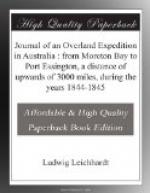July 7.—Charley told me that he had followed the river up to its termination. I consequently kept a little more to the left, in order to head it, and travelled two or three miles through a fine bloodwood and Nonda forest, the verdant appearance of which was much increased by the leguminous Ironbark, which grew here in great perfection. Two emus had just made their breakfast on some Nonda fruit when we started them, and Charley and Brown, assisted by Spring, succeeded in killing one of them.
We soon came to a salt-water river, with a broad sandy bed, perfectly free of vegetation, although its banks were fringed with drooping tea-trees. The tide being low, we were enabled to ford it. Whilst crossing it, a flock of black-winged pelicans stood gravely looking at us. The latitude of the ford, which was two miles and a half south from our last camp, would be 16 degrees 30 minutes, which corresponds with that of the Staaten, marked at the outline of the coast. A well grassed open forest extended along both sides of the river; and, at its left, large deep Nymphaea lagoons were parallel to it. South of the Staaten, we travelled over a forest country, similar to that of former stages, and which might be aptly distinguished by the name of Grevillea Forest; as Gr. mimosoides (R. Br.) is its characteristic feature; though a rather stunted stiff-leaved tea-tree was more numerous. Some slight rises were covered with thickets of the Acacia of Expedition Range. The last six or seven miles of our stage were over an immense box-flat. We passed many spots lately burnt by the natives, and saw the smoke of their fires in every direction. We encamped on a good sized creek, on which grew the articulate podded Acacia, the Mangrove Myrtle (Stravadium), and the drooping tea-tree. As soon as we had pitched our tents, we cut up the hind quarters of the emu into slices for drying; but we had to guard it by turns, whip in hand, from a host of square-tailed kites (Milvus isiurus).
John Murphy and Charley, whilst riding round the camp to ascertain if natives were in the neighbourhood, came on one of their camps occupied chiefly by women, and a few old men, who immediately ran off, but set the grass on fire as they went, to prevent the approach of the horsemen; and left behind them their waddies, spears, and a good supply of potatoes. At dusk, when Charley brought in the horses, two of which we tethered near the camp, the form of a native glided like a ghost into our camp, and walked directly up to the fire. John, who saw him first, called out, “a Blackfellow! look there! a Blackfellow!” and every gun was ready. But the stranger was unarmed, and evidently unconscious of his position; for, when he saw himself suddenly surrounded by the horses and ourselves, he nimbly climbed a tree to its very summit, where he stood between some dry branches like a strange phantom or a statue. We called to him, and made signs for him to descend, but he




